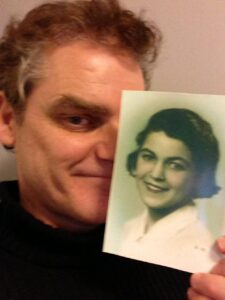
Shelley Thompson as Mary Mercer and Hugh Thompson as Jacob Mercer. Photo by Stoo Metz.
It feels even more auspicious because Ted Dykstra was in the audience tonight, but as I sat at the Breaking Circus venue tonight watching Matchstick Theatre’s production of David French’s play Leaving Home I wondered if this was how audiences felt on July 5, 1998 watching The Misanthrope on the first day of Soulpepper Theatre’s inaugural season at the Harbourfront Theatre in Toronto. Did they feel like they were witnessing the beginning of something that would change the theatrical landscape of their city? Did they feel excited and invigorated by the open door of possibilities before them, thinking, if they can do this play at this calibre, surely they could also someday do this one, and this one, and oooh this one? Although it is not its first production Leaving Home is certainly Matchstick’s most ambitious production to date, and, perhaps because of the venue at Breaking Circus, it was the first time I really felt that if Matchstick continues to create work at this level, even within this housing crisis, they will have their own theatre building in Halifax someday.
Leaving Home premiered at the Tarragon Theatre in Toronto on May 16, 1972 and it was directed by Bill Glassco. It became the first of what are known as The Mercer Plays, which all centre on the Mercer Family of Newfoundland confronting a changing world in the first half of the twentieth century. They became landmark Canadian plays, and among the first to present Atlantic Canadian characters in such a rich and three dimensional way.
The play centres on the Mercers, who have now moved from Newfoundland to Toronto: Jacob, played by Hugh Thompson, and Mary, played by Shelley Thompson, and their two teenaged sons Ben, played by Lou Campbell, and Billy, played by Sam Vigneault, on the eve of Billy’s shotgun wedding. Secrets are revealed after much alcohol is consumed, and all four Mercers, along with Billy’s fiancée Kathy, played by Abby Weisbrot, and her mother Minnie, played by Sharleen Kalayil, take the opportunity to get some longstanding grievances off their chests. The result is a poignant, raw, and arresting portrait of a family that has inherited all the hardships from their parents, and also all the hardships from their people. Ben, especially, is trying to break the cycle. He is a high achiever at school, and gets a scholarship to attend university. He tries to stay away from alcohol and doesn’t have a girlfriend. Jacob is both bursting with pride over his son and resentful of how Ben’s academic knowledge makes it seem like there is a chasm between them constantly accentuating Jacob’s grade three education. Jacob loves Ben so hard that it often looks like revulsion and abuse. How can Ben and Billy learn to love someone any differently when they have grown up associating affection with antagonism? Mary is at her wits end trying to both bring her sons and their father together, and, for the sake of their bruised faces and bruised egos, to keep them as far apart as possible.
Jake Planinc directs the play in the round, with the audience peering directly into the Mercer’s kitchen and living room, almost as though they are in a fishbowl. Wesley Babcock has created a beautiful set that immediately establishes us in the 1950s in a small house where we watch the action from different angles- the three dimensionality of the stage design mirroring that of the characters in the script. Like Harold, Minnie’s new boyfriend, played by Sébastien Labelle, we are mute but rapt visitors to the drama unfolding in front of us in this house.
Abby Weisbrot plays Kathy, a pragmatic young worker a bit desperate to move out and away from her own mother, and who sees Billy as her opportunity for a socially acceptable escape. Weisbrot plays Kathy as a bright girl, engaged in all the conversations happening around her, but one of the few in the household who is able to hold her tongue. There she is equally matched by Vigneault’s Billy, who also prefers to take in everything being yelled around him, wide eyed and overwhelmed, but unlike Kathy, who seems to know her own mind, Billy looks for the right person moment to moment to lead the way, dextrously oscillating between siding with his father and his mother, or even his brother, whichever way the most innocuous wind is blowing, suggesting that he will eventually do the same with his wife. Sharleen Kalayil, on the other hand, as Minnie, is constantly looking for more destructive ways to rock the boat. Whether it’s insulting her daughter, flirting with Ben, stirring up memories from when she used to court Jacob back in Newfoundland, or dancing around the Mercers’ humble abode in an elegant fur coat and stunning red dress, Minnie lives to be outrageous and Kalayil walks a thin line of being both hysterically funny and a little bit horrifying. Lou Campbell plays Ben, sullen and dejected, a son who is just trying to stay under the radar, but who keeps getting pulled into the fray. I was curious about whether there were moments where we saw the real Ben shine through, the guy he was at school, and the guy he might someday be once he left home. Even with his mother and his brother Ben always seems like the weight of the world is on his shoulders. It might be nice for the audience to see a bit more of what could have been for him, and what is at stake for him to lose.
Shelley Thompson and Hugh Thompson are so perfectly cast as Mary and Jacob Mercer. Everything they say to one another, and everything they hear the other say is so nuanced and packed with over twenty years of history, both the happiest of memories, and recollections of every single slight, hurt, heartbreak, and row they’ve ever had. Shelley Thompson’s Mary is desperate to smooth everything over, to sweep everything under the rug, not just tonight, but every night, and Hugh Thompson’s Jacob is determined to tear everything down, to tear off his own nose to spite his face. The way they both handle these collision courses with one another is absolutely riveting, oscillating from tenderness to hilarity, meanness, to guilt, to shame, to despair, and compassion. You can feel like you’re on the Mercer merry-go-round; you may be seeing this scenario play out for the first time, but for these characters they just keep going around and around and around, without enough self-awareness to stop. Shelley and Hugh feel born to play these roles and to play them together. The casting could not be more perfect.
According to Wikipedia David French once wrote about the creation of this play thus, “The more I began to understand the relationships in the family the more moved I became. There were times I couldn’t see the typewriter for tears, and times I would almost topple my chair howling with laughter at the funny things the people said and did.” Over fifty years later, I think Leaving Home still leaves audiences with both those experiences: roaring with laughter and then being overcome with pathos for these people who are trying so hard, but who can’t get out of their own ways.
In May of 2007, just before I moved to Toronto, Ted Dykstra directed the first remount of Leaving Home in Toronto since its premiere at Tarragon, at Soulpepper Theatre. This feels like a circular moment to me, perhaps even a passing of a torch. I’m a huge fan of new work, but Halifax needs another theatre company that does productions of older plays, especially in the spring, fall, and winter seasons. Matchstick Theatre is exactly what I think Halifax needs in this regard, and I’m excited to see how the company might grow even more into this role over the next few years. If Leaving Home is any indication, we’re in for a very fulfilling and galvanizing time.
Matchstick Theatre’s production of David French’s play Leaving Home plays at 2164 Barrington Street, Halifax until March 31st, 2024. Shows run Wednesday to Friday at 7:30pm, Saturdays at 2:00pm at 7:30pm, Sunday March 24th at 2:00pm and 7:30pm, and Sunday, March 31st at 2:00pm. Some shows are already sold-out. Tickets are $32.84 (including fees) and are available at this website.
The production runs 2 hours long, including one fifteen minute intermission.
Venue Accessibility
Leaving Home plays at 2164 Barrington Street (Breaking Circus’ venue), which is a fully physically accessible performance venue. However the roads and parking surrounding the building are quite messy and complex at the moment, due to massive construction on the Cogswell exchange happening next door. We encourage audience members to please have a thorough read of our Venue Accessibility page (found by clicking here), which details the accessibility aspects in the venue, as well as the best places to park nearby and walk down to the venue ahead of the show, with pictures.
Importantly, if you are a wheelchair or powerchair user, please let us know ahead of time. There is very limited parking available in front of the performance venue, but with enough notice, we will save for those in chairs for easier access.
There will be a small bar available with limited drink options before showtime and at intermission.
For Content Warnings and Food Allergy Alerts Please Click Here.







2 thoughts on “Hugh Thompson & Shelley Thompson Some Good in Leaving Home”
Comments are closed.